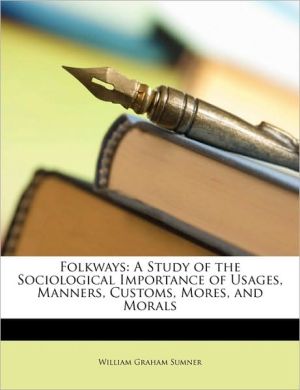

 |

|

The average rating for Folkways: A Study of the Sociological Importance of Usages, Manners, Customs, Mores, and Morals based on 2 reviews is 4 stars.
Review # 1 was written on 2013-02-18 00:00:00 Nicholas Clemente Nicholas ClementeFound among George Washington's manuscripts was a little book he wrote in from about the age of 14 to 15. Conway's book is a scholarly look at an excerpt from a section of the manuscript titled "Rules of Civility and Decent Behaviour in Company and Conversation." Conway gives a little background context and some commentary. He includes excerpts from French and Latin works from which these rules are believed to be primarily derived, along with speculation such as whether Washington was working under an instructor, as he did not know French and there is an uncharacteristic use of abbreviations, etc. I focused mainly on the rules Washington had written out. Some of these rules are antiquated. Many have to do with observing rank, such as who should walk closest to the street, what to do when someone of higher or lower rank enters in the middle of a conversation, etc. Some are downright hilarious and many are just as applicable today. Civility is unfortunately becoming a lost quality and something not readily sought after. In my mind's eye, I see a young George Washington pondering and recording these instructions, much like a 14 year old today would be thinking about which utensils to use if they were going to a very formal dinner. Here are several that I took notice of, in random order-- Do not seek amusement in singing to yourself, unless beyound the hearing of others, not drum with your hands or feet. Have a great regard for the cleanliness of your hands, but do not be finikin about it. Take no pleasure in examining curiously defects or blemishes, although natural, especially if they be in the face, nor enquire what they proceed from.... Jesting must be avoided when it is out of season....never laugh at the misfortunes of others, although they seem in some sort laughable. Put not off your cloths in the presence of Others, nor go out of your Chamber half Drest. When you go to see any sick person do not immediately act the physician if you are not experienced in that science. Shake not the head, Feet, or Legs rowl not the Eys, lift not one eyebrow higher than the other wry not the mouth, and bedew no mans face with your Spittle, by approaching too near when you Speak. Do not flatter or wheedle any one with fair words, for he who aspires to gain another person by his honied words shows that he does not hold him in high esteem and that he deems him far from sensible or clever, in taking him for a man who may be tricked in this manner....Do not play practical jokes on those who do not like it. Reproach none for their infirmities'avoid it equally when they are natural ones'and do not take pleasure in uttering words that cause any one shame, whoever it may be. Do not express Joy before one sick or in pain for that contrary Passion will aggravate his Misery. ...if you Deliver anything witty and Pleasent abtain from Laughing thereat yourself. Wear not your Cloths, foul, unript or Dusty but See they be Brushe'd....Do not carry your cloak over your arm after the manner of swaggerers. Do not set to eating even in the house out of meal-times; at least abstain from it in the presence of others. If you wish to pass as genteel, always go with well-bred people; if you cannot get the chance, --from not knowing any, or any other reason,--it is always better to go alone than in bad company. When talking with learned and clever men, do not introduce trifles, and do not bring forward too advanced conversation before ignorant people which they cannot understand nor easily believe...Do not speak of things out of place, or of such as may shock your hearers. At banquets and on days of rejoicing do not bring up sorrowful news or accounts of sad calamities, no filth, nothing improper, nothing afflicting. NEVER RELATE YOUR DREAMS except to your confidants... Take care not to speak ill of any one or to gossip of others people's affairs. Never give your advice on matters when it has not been asked..... Do not be the censor and judge of other peoples' faults.... Abstain from drawing comparisons between different persons.....For all comparisons are odious. Being seated at the table, do not scratch yourself, and if you can help it, do not spit, cough, or blow your nose Labour to keep alive in your Breast that Little Spark of Celestial fire called Conscience. |
Review # 2 was written on 2012-01-24 00:00:00 Kelly Tranberg Kelly TranbergThis is a collection of sayings which George Washington copied as a schoolboy. The origins of some of these rules of conduct, or civility, go back into the 1600s. Many of these things have been lost on the modern culture and some should be revived. These rules are those which Washington himself strove to abide by and keep. They speak volumes of his character, and the characters of the other great fathers of our country. If we were to heed the advice of these rules, the world might be a slightly better place and we might gain some of our patriotism back. This is a fairly short read, and best of all, it is a public domain work and can be found for free for almost any device and in many formats. No American has an excuse for not reading this. Although some of the rules may seem dated, many are still important to be upheld in society today but, sadly, are not. |
CAN'T FIND WHAT YOU'RE LOOKING FOR? CLICK HERE!!!